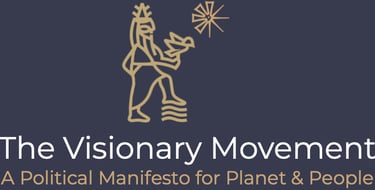CRIME & POLICING
From punishment to prevention: ending crime by addressing the causes, not the symptoms.


A Crime-Free Society
We don’t believe tackling crime is about creating more rules or taking away people's rights and freedoms. Real crime prevention means understanding why people turn to crime in the first place and tackling those problems head-on.
Crime rates in the UK have historically been linked to unemployment and economic crises. Many individuals classified as criminals often commit offences in response to these challenges. What society defines as crime, some may view as a means of survival. This is because, when money, opportunity, and a sense of hope are scarce, people often feel that crime is the only answer. And often without a solid education or happy childhood, the chances of turning to a life of crime become ever greater.
We regard every crime as a failure of current leadership and policy. The persistence of societal issues and rising crime statistics reflect a lack of effective governance and a failure to address underlying problems. Some would even argue this is done intentionally to perpetuate a totalitarian police state and justify ever-growing budget allocations for despotic authoritarian measures.
Prevention Rather Than Cure:
Addressing The Root Cause Of The Problem The need to address the issue of crime never goes away and over the years we have seen it invade our schools and homes to a staggering degree. We can stop this self-destructive cycle by fulfilling our promises; by investing in the things that really matter, by managing our economy sensibly, by improving everyone's standard of living and by giving everyone the opportunities and support they need to achieve their life goals and ambitions.
If we are to significantly reduce crime we must turn to the root of the problem and put preventative measures in place. To ultimately eradicate crime, we must completely eliminate the reasons people turn to crime to begin with. We will begin to avert any further social and economic crises simply by providing people with a secure home and safe community in which to live.
To address these issues, we propose:
Better Education: Made freely available to everyone, without exception.
Economic Empowerment: Implement policies that create employment and alleviate economic hardships—the root cause of crime.
Reformative Justice: Shift focus from punitive measures to rehabilitation and reintegration, reducing recidivism and fostering societal harmony.
Comprehensive Social Programs: Invest in counselling and mental health services, interventions, and community development to provide support and opportunities for all citizens.
Opportunities For Young People: Invest in reintroducing sports and arts activities, youth programmes, apprenticeships, summer camps, further education, vocational learning, and mentorships.
By adopting these strategies, we aim to create a society where crime is not a response to unmet needs but a rare occurrence, reflecting the success of visionary stewardship and effective policy.
“Eradicate the causes of crime and you eradicate crime.”
Andrew Greenhalgh


Transforming UK Policing
A Vision For Integrity, Unity, And Community Trust
To address pressing issues within UK policing, we propose a comprehensive reform strategy focusing on recruitment, integrity, structural consolidation, authority reassessment, and community relations.
Recruiting The Right Candidates
We aim to attract individuals who embody the qualities of peacemakers, diplomats, and those with a genuine commitment to public service. To achieve this, we will implement comprehensive psychological assessments for all applicants and existing officers. These evaluations will assess candidates' mental resilience, emotional intelligence, and capacity for empathy, ensuring they are equipped to handle the complexities of modern policing.
While the Myers-Briggs Type Indicator (MBTI) is a widely used tool for understanding personality types, its application in police recruitment is limited. More commonly, psychological evaluations focus on assessing candidates' ability to cope with stress and their overall mental fitness for the demands of law enforcement.
Eradicating Corruption
We are committed to eliminating corruption within the police force. Only individuals of the highest moral standing will be entrusted with the responsibility of upholding the law. This entails rigorous vetting processes, continuous monitoring, and a culture that promotes transparency and accountability. The Angiolini Inquiry has highlighted the need for enhanced vetting and aftercare to maintain public trust.
Source angiolini.independent-inquiry.uk
Unifying The Police Force
To enhance efficiency and resource allocation, we propose consolidating the existing fragmented forces into a single national police force. Furthermore, integrating the UK's police force under the British Army's remit, including funding, aims to enhance efficiency and accountability through shared resources. This consolidation seeks to streamline operations, reduce administrative overhead, and foster a unified command structure, ultimately improving public safety and trust.
This unification aims to reduce administrative costs, streamline processes, and improve coordination in combating crime. The new structure will consist of one UK Commissioner, four Deputy Commissioners, and 48 regional Chief Constables, ensuring both national oversight and regional representation. Discussions around police force mergers have been ongoing, with considerations of improved efficiency and service delivery.
Re-evaluating Police Powers
We will implement a policy where officers must establish solid cause before taking action, including stop and search procedures. Once justified, officers will be granted the necessary authority to apprehend and detain individuals. This approach balances civil liberties with effective law enforcement, ensuring actions are justified and proportionate.
Fostering A New Policing Mentality
Our goal is to cultivate a police force that communities welcome and trust. Officers will be retrained to embrace the principles of 'serve and protect,' emphasising their duty to all citizens—not just those in positions of power or influence, who often hide behind their titles to avoid the scrutiny of the law.
By addressing the root causes of social unrest through effective governance, we anticipate a significant reduction in riots and demonstrations. As crime rates decline overall, the role of the police will evolve towards guardianship and stewardship. Integrating police and army training will allow personnel to transition between roles as needed, enhancing flexibility and operational effectiveness.
Through these reforms, we aim to build a policing system that embodies integrity, unity, and a steadfast commitment to serving the public.
“There is a crisis of public morality.
Instead of policing bedrooms,
we ought to be doing a better job
policing boardrooms.”
Robert Reich
GET IN TOUCH
SUBSCRIBE FOR UPDATES
WhatsApp: +44 (0)7413 47 46 48
© 2025. All rights reserved.


FOLLOW
Support the movement: Make a Donation






